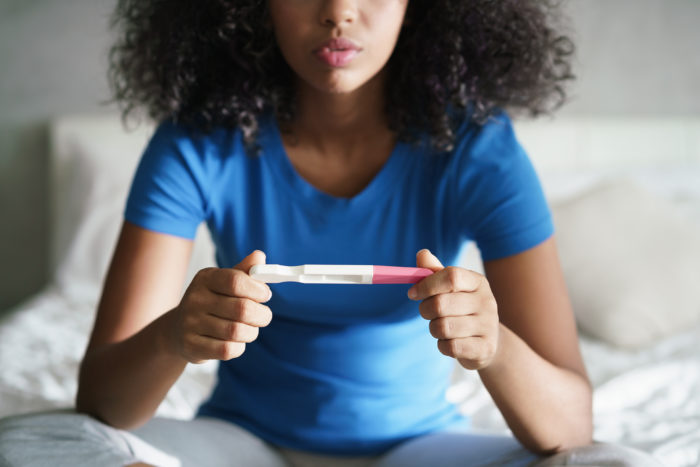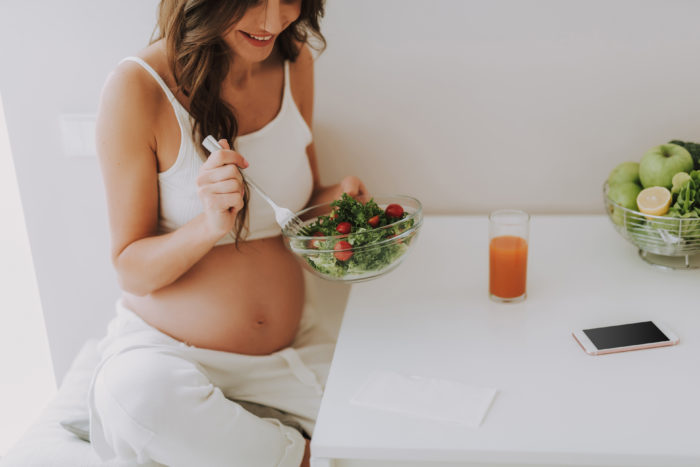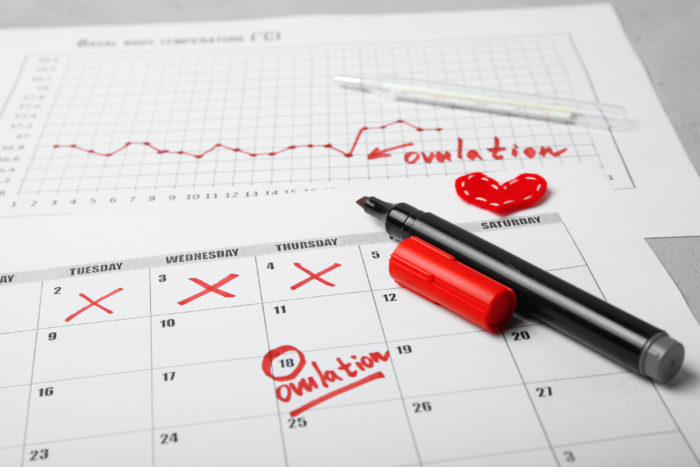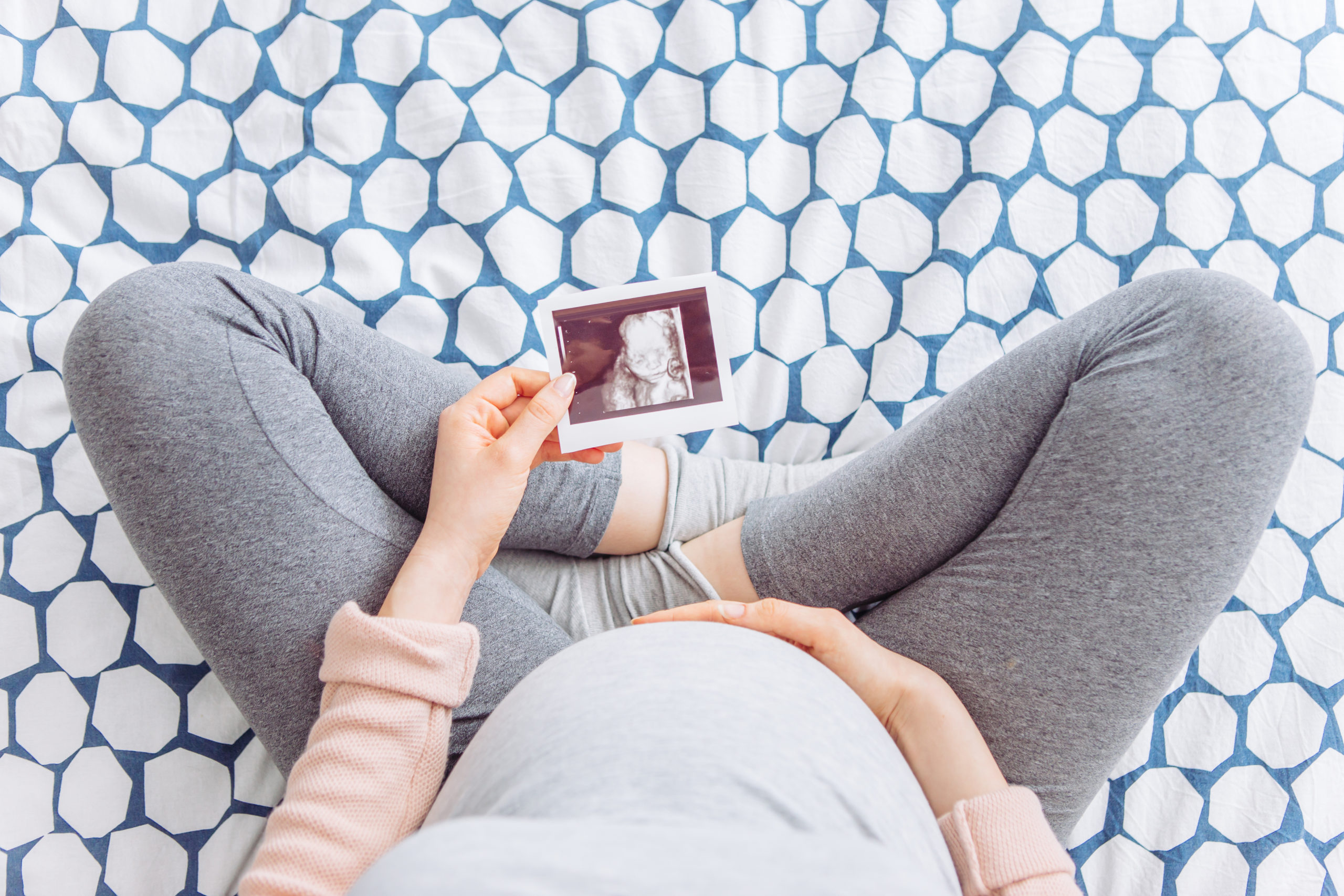This post may contain affiliate links.
“Do I have to gain weight or body fat to get pregnant?” I get asked this question frequently, and the answer is more complicated than you may think. If you’re asking this question, read on to learn if your optimal fertility depends on weight gain.
One of the most common causes of infertility I see in my clients is a history of dieting, excessive exercise, and/or a preoccupation with maintaining a certain weight or body fat percentage.
And sadly, I talk to women on a regular basis who struggle with the idea of letting go of control over their body size in order to successfully get pregnant.
The fact is, to achieve a healthy pregnancy, your body has to feel safe.
And unfortunately, in today’s hustle and grind society, our body’s safety is typically not our top priority.
Many young women are more concerned with hitting PR’s at the gym, moving up the ladder in their career, fitting into their favorite pair of jeans, and still having enough time and energy to hang out with their friends.
If starting a family is on your mind – either now or in the future – you may have to shift your priorities. Especially if some of your priorities have been focused on keeping your body fat percentage low.
For your body to sustain a healthy pregnancy you have to focus on making your body feel safe. And that may require some lifestyle changes that can also lead to weight gain.
If you’re thinking of starting a family and want to best prepare your body (and your mind) for a healthy pregnancy, this article is for you!

How Being Underweight Can Impact Fertility
Body fat plays a significant role in women’s fertility. It’s believed that the optimal body fat percentage range for female fertility is somewhere around 22-28%.
Our ovaries produce the majority of our sex hormone, estrogen. But sex hormones are fat-soluble. And fat cells are also responsible for the production of some of this fertility hormone.
When you’re underweight or don’t have enough body fat, your ovaries produce less estrogen. This can impact your menstrual cycle and whether you ovulate or not. And if you aren’t releasing an egg each month, your chances of getting pregnant naturally are much lower.
So if you’re underweight or don’t have a lot of body fat, you might have to gain weight to get pregnant.
Being underweight and having a low body fat percentage is also one cause of amenorrhea.
Women’s bodies, in general, need to carry more body fat than a man’s. For the same BMI, women have about 10% higher body fat percentage than men. Women’s higher levels of estrogen cause most of this difference between genders.
And when it comes to estrogen and body fat, it’s a two-way street. Estrogen increases our body fat percentage. But when that body fat percentage drops too low, our estrogen levels will also suffer.
The bottom line is that, as women, we need a certain amount of body fat to have healthy, happy hormones.
And yes, that might mean you have to gain weight – specifically body fat – to get pregnant.

Do You Need to Gain Weight to Get Pregnant?
There isn’t one right answer to this question. Some women can get pregnant easily at a lower body fat percentage, and some women may actually benefit from a modest reduction in body fat to maximize their fertility.
But, if you’re asking yourself if you need to gain weight to get pregnant… you may already have an idea of the answer.
If you’re unsure, there are some signs your body could be giving you that show gaining weight would be beneficial.
BMI is certainly not the best indicator of health. But it can be beneficial in determining if gaining weight would help you get pregnant.
If your BMI is below 17, you’re at a greater risk for dealing with infertility than if your BMI was in a more “normal” range.
If your cycles are irregular or absent, and your body fat percentage is less than 22%, gaining weight could help you conceive.
And if you often feel worn down or tired after workouts, reducing exercise (which can sometimes lead to weight gain) could make getting pregnant easier.
Again, there’s no one way to determine if you need to gain weight to get pregnant. Ideally you should chat with your personal healthcare provider to see if you might benefit from some extra body fat in your fertility journey.
But remember, when it comes to fertility, your body is looking to be in a place of stability and safety. And having a minimum percentage of healthy body fat is one way that it meets those needs.
Of course, there is so much more to fertility than weight gain. If you want to optimize your fertility beyond reaching a healthy body weight, keep reading to learn how you can support your reproductive health.

There’s More to Fertility Than Weight Gain
If you’re underweight, gaining a few pounds might not be enough to improve fertility.
Being at a healthy weight is critical for sustaining a pregnancy, but it’s not the only piece of the puzzle.
Your body isn’t going to be receptive to getting or staying pregnant if you’re:
- running yourself into the ground with an excessive workout routine
- stressing so much that you can’t sleep or eat normallyd
- altering your diet dramatically to meet a body composition goal
- engaging in negative self-talk thought patterns
Becoming pregnant often requires a shift away from our old way of living.
We need to shift away from mindset of only living for our desires or society’s expectations, and towards one that nourishes us. A well-nourished body will be able to support the healthy development of another human for 9+ months. (After all, you burn more energy breastfeeding a baby than you do growing one!)
Here are a few ways that you can shift your focus and help get your body ready for a healthy pregnancy.

Eat Enough Food
Nourishing your body with enough food is always important, but especially when you’re trying to get pregnant.
And eating enough food is also going to be your best friend if you do need to gain weight to get pregnant.
Now, “enough” food is going to look different for everyone. What is “enough” to nourish your body will likely be different from what your best friend needs to nourish hers.
The first step to ensuring that you’re eating enough food is to determine your daily caloric needs. This calorie needs calculator is going to be the most accurate way to do that.
From there, you’ll know approximately how much you should be eating for your body type and activity level. Then you need to get a picture of what you currently are eating.
To do this, I recommend using an app like MyFitnessPal to track your food intake for a few days. Tracking what you eat at every meal and snack isn’t the most fun thing ever. But this is the best and most accurate way to determine if you need to make any shifts in your eating habits.
Once you’ve got a good look at what you’re actually eating, compare it to what you should be eating.
From there, some adjustments might be necessary for promoting pregnancy. These adjustments could be things like increasing calories to gain weight, or adjusting macro ratios.
If you need help figuring out what “enough” food is for you, especially when you’re trying to get pregnant, I’d love to help. Click here to learn more about how you can work with me.
Keep Your New Goal in Mind
If you desire to get pregnant, your #1 goal must be to nourish your body with enough food so that it can sustain a healthy pregnancy.
You’ll likely need to set aside your fitness or body composition goals. There is a time and place for that, but when your goal is to start a family, your ideas about your body have to change to match.
And yes, that might mean some weight gain is necessary. If that idea bothers you, you might need to do some deeper soul searching before you decide to start a family.
Pregnancy and motherhood is only the beginning of laying down some of your desires for the betterment of another. And for many, this requires putting aside your desire for your body to look a certain way for a season (or possibly even for good.)

Get a Wide Variety of Nutrients
Nourishing your body with a wide variety of nutrients is also essential for a healthy pregnancy.
Both macronutrient and micronutrient intake are important when it comes to fertility. The goal with any macronutrient change should be to optimize insulin sensitivity and blood sugar balance, which is benefitted by eating adequate protein and fat, avoiding highly processed carbs, and including real food “slow” carbs.
For women who are at a lower body weight or lower body fat percentage, this may actually mean increasing carbohydrate intake.
This doesn’t mean you need to include lots of highly processed carbs in your diet, especially if they don’t make you feel your best. There are plenty of other real food sources of carbs that can support optimal insulin sensitivity.
To increase your intake of starchy carbs during meals, try including a serving of foods like sweet potatoes, plantains, cassava root, white potatoes, or winter squash. Fruit is another great way to boost carb intake from whole foods. And if you tolerate grains, you may do better with sprouted whole-grain bread or rice-based pasta, rather than refined wheat products like white bread and white pasta.
Most women’s hormones are healthiest when they’re eating at least 25% of calories from carbs. And if you’re highly active or at a low body fat percentage, that number might need to be even higher.
Getting enough healthy fats in your diet can also improve fertility.
Besides focusing on consuming enough fats, you should try to avoid inflammatory fats. Inflammatory fats often come in the form of refined oils like canola and vegetable oils. These are typically found in processed foods.
Instead, cook your foods in real food fats like butter, olive oil, coconut oil, lard, and/or avocado oil.
Micronutrients Matter Too
When you’re pregnant, you’re responsible for meeting the nutrient needs of not only yourself but your growing baby too.
If you’re malnourished in any vitamin or mineral, it’s possible that nutrient deficiency could prevent you from getting pregnant.
Eating a real-food diet that includes a wide variety of fruits, vegetables, and animal proteins is one of the best ways to ensure your micronutrient stores are maintained.
But for women wanting to get pregnant, supplementing is also recommended and even necessary.
I recommend taking a high-quality prenatal supplement, like this one or this one, at least six months before trying to conceive.
A good prenatal will contain nutrients from real food sources and be rich in folate (not synthetic folic acid).
You also might want to consider supplementing with a high-quality fish oil/DHA, iron, and magnesium, depending on the types of foods you eat.
These nutrients are essential to your growing baby’s health and help to keep you feeling your best throughout your pregnancy too.
These suggestions will be beneficial for most people. But always check with your doctor or personal healthcare provider before adding any supplements to your routine.

Moderate Your Activity Levels
Physical activity, in general, is beneficial for improving fertility and while pregnant. But, there are some cases where too much activity at too high of an intensity can impact reproductive health.
Consistently overtraining and undereating often results in decreased fertility.
So if you’re hitting the gym most days per week and are struggling to get pregnant, taking some time off will be beneficial.
Of course, this doesn’t mean that everyone needs to reduce their workout routine to get pregnant.
But if your training leaves you feeling worn down, sore (or one of these other nine signs), reducing frequency and intensity is a good idea.
Exercise is a stressor on our bodies. Most of the time it’s a good stressor that helps strengthen our muscles and increase our endurance. But if you’re already dealing with stress elsewhere in your life, the physical stress of intense training could be too much for your body.
It’s important, no matter your goals, to observe how you feel after each training session. Not just physically, but mentally as well. You should feel energized, not exhausted.
And when it comes to getting pregnant, less stress is always going to be better. And that might mean modifying your training schedule to improve your hormonal health.

Reduce Stress
Stress isn’t great for any area of our health, and it’s especially harmful for our fertility. With the lifestyles many of us live today, stress is the norm more often than not.
The hypothalamic-pituitary-adrenal (HPA) axis, when activated by stress, inhibits the function of our reproductive system. Corticotropin-releasing hormone (CRH) inhibits hypothalamic gonadotropin-releasing hormone (GnRH) secretion, and glucocorticoids inhibit pituitary luteinizing hormone and ovarian estrogen and progesterone secretion. Stress has been shown to reduce estrogen and cause menstrual cycle irregularity.
We see this effect of stress playing out in women’s ability to get pregnant, too.
Women who worked more than 32 hours a week took longer to conceive than women who worked less than that.
And taking measures to decrease stress levels improved their ability to conceive.
These results, of course, don’t mean that having a full-time job will keep you from getting pregnant. They simply point to the fact that excess stress greatly influences our fertility.
The good news? There is a lot we can do to overcome the state of constant stress most of us live in these days.
Implementing relaxation and meditation practices can be helpful. Journaling before you leave for work and again before bed can help calm your mind. And shifting your mindset to change your perception of stress – to not let little things like traffic or a work deadline stress you out – can be beneficial for fertility.
Sometimes those small lifestyle adjustments aren’t enough. If that’s the case, you might need to take a step back and reprioritize some bigger things in your life.
Is working out every day after work introducing more stress into your life? Are you committing to too many activities that leave you little time for yourself? Is the way you view your self-image draining life from you and causing unnecessary mental stress?
Reducing stress isn’t always simple, but it can go a long way when it comes to increasing your fertility.

Test for Optimal Hormone Health
Getting pregnant is much easier when you know that your hormones are working on a consistent cycle each month.
Our sex hormones estrogen and progesterone control our menstrual cycles. And if either of them is out of balance at any time during the month, it can affect our menstrual regularity and our fertility.
Imbalances in these sex hormones can result in anything from a cycle that’s longer or shorter than ideal, to a missing period altogether.
If you think a hormonal imbalance could be behind your difficulty getting pregnant, or if you just want to make sure everything is working optimally, there are a few ways you can evaluate your hormonal health.
Cycle tracking methods, like the Fertility Awareness Method (FAM), are helpful at showing you how your hormones are functioning.
FAM uses fluctuations in basal body temperature and cervical mucus to help you better predict when you ovulate and the length of each phase in your cycle.
With the results each month you can get a better picture of your hormonal balance and how it may be affecting your fertility.
If you want a deeper dive into using this method, the book Taking Charge of Your Fertility is a great guide.
Digging Deeper into Hormonal Imbalance
If you think that tracking your cycle with FAM has uncovered a hormonal imbalance, testing is a good next step.
My preferred way to test hormonal health is to run a DUTCH test. This is a urine test that looks at our sex and adrenal hormones at a certain point during our cycle.
If you do uncover any imbalances, there are supplements and lifestyle adjustments to get you back on track.
Sign up here for a strategy session with me if you think that digging deeper into hormonal imbalances could help improve your fertility.
And if your cycles are irregular or missing altogether, I developed a free training that can help. It’s dedicated to helping women regain normal menstrual cycles and their fertility naturally!

A Mindset Shift for a Healthy Pregnancy
The truth is that you may need to gain weight to get pregnant. And if your reaction to this statement is one of devastation or loss, you must shift your perspective about your body and your worth as a woman.
When you’re pregnant, your body is no longer your own. You are sustaining and providing life for a precious, tiny human being. And your weight shouldn’t affect how you treat your body while you go through the miraculous journey of motherhood.
If controlling your weight is the first thing that comes to mind when thinking about getting pregnant, you need to do some refocusing on what’s important in the long run.
If your goal is to get pregnant and start a family, you need to start looking at your body in a different light.
The primary purpose of your body is not to look good or to perform at its peak condition. And if you desire to get pregnant, you must consider the health of your future child – and your health as a mother – as a higher priority than what you look like in the mirror.
Stop focusing on how your weight might change on your fertility journey. Instead, think about what you can do to make your body the best and safest possible home to nurture and grow a human being.
Maybe that’s gaining some body fat, reducing your workout intensity, managing your stress better, or something else entirely. Whatever it is for you, shifting your focus to cultivating a body and mind that’s healthy and nourished in all areas should be your main priority.
You might even find that you enjoy and appreciate this version of yourself even more than the body you were so focused on before.
Now it’s your turn – how has this post changed the way you view your body and getting ready to get pregnant? Share your thoughts in the comments!

+ show Comments
- Hide Comments
add a comment